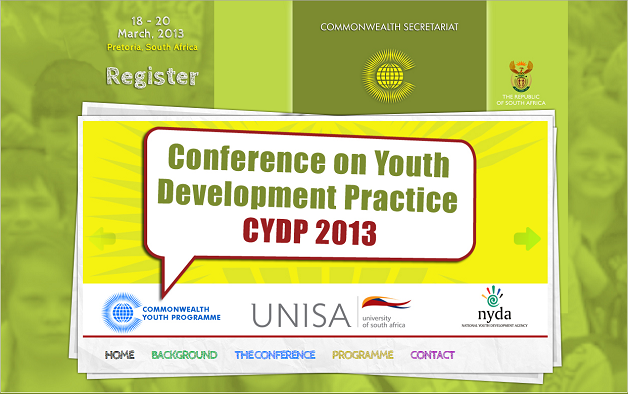Nation to Host an International Conference On the Professionalisation of Youth Work
November 26th, 2012The Government of the Republic of South Africa in partnership with the Commonwealth Africa Regional Centre, University of South Africa (UNISA) and the National Youth Development Agency (NYDA) today launched South Africa’s hosting of the Commonwealth Youth Work Conference on Education and Training of Youth Workers in March 2013. The purpose of the conference is to engage various public, private, academic and diplomatic stakeholders on the importance of capacity building for youth workers.
In the context of the African and specifically South African growth of the youth population, the Commonwealth Youth Work Conference presents an opportunity to promote the education and training of youth workers as primary providers of services to the youth. The Commonwealth Youth Work Conference is launched under the theme “Towards professionalising youth work ” and seeks to highlight the importance of promoting youth work as a viable career choice in preparation for conference.
According to the Deputy Minister in the Presidency Obed Bapela, “Ignoring the plight of youth workers will have dire consequences for decades to come, because as frontline workers they have influence on the direction which young people take and the youth in turn also have influence on the direction which society takes. The upcoming conference will provide a platform for all practitioners, researchers, policy makers, government, academics and students to provide input on the importance of professionalising youth work.”
The Commonwealth Youth Programme Manager, Victor Mensah said, “The Commonwealth Secretariat is happy to join hands with the all the partners in launching the International Conference on Youth Development Practice (CYDP 2013). This is a landmark event that will help professionalise the work of Youth Development Practitioners around the world.”
The NYDA remains committed to facilitating training programmes for prospective youth workers, like the Education Training and Development Practices Sector Education and Training Authority (ETDP SETA) accredited programmes, Youth Development Foundations and Facilitating Skills Training programmes with a demand for these programmes continuing to grow.
According to the NYDA CEO, Steven Ngubeni, “The development of standards to guide the profession is fundamental to developing youth practitioners. We also need to ensure that a Code of Ethics is established to guide the work of practitioners and that the interests of youth are protected.
The NYDA CEO further added that, “The NYDA will be commencing in earnest with the legislative process that will amongst others lead to the creation of the Youth Work Profession Council from next year onwards. The Council will ensure that the code of ethics is developed and adhered to, youth workers are registered in a comprehensive database, youth workers receive continuous development, RPL processes are established, occupations are developed for the different levels of youth workers, career paths are developed, youth work qualifications are developed and offered by more HEI’s, more young people are enrolled in youth work qualifications, communication is maintained with stakeholders and a vision for employment of youth workers is executed.”
This piece of legislation, according to the CEO: “Will ensure that clarity and leadership is provided about making sure that youth work is mainstreamed into all the spheres of the society.”
Some of the activities that will be executed in preparation for the conference include, but are not limited to:
- Conducting regular communications to inform the stakeholders in the youth development sphere about progress made in this regard.
- Establishing a steering committee for the organisation of the conference.
- Raising funds by engaging relevant stakeholders.
- Confirm host city and venue.
- Outline the programme for the conference.
- Identify the programme director for the conference.
- Identify the list of facilitators for the different sessions.
- Refining the list of speakers to ensure that they represent all the spheres of society on topics that are relevant.
Currently only six universities in South Africa offer a ‘youth work’ qualification and it is envisaged that in formalising youth work as a profession, education and training, increased research activity in youth development and the mastery of specialised knowledge will be achieved.
According to Prof Mandla Makhanya, UNISA Principal and Vice Chancellor, “UNISA acknowledges the need for higher education institutions to professionalise youth work, and has demonstrated that stance in its championing of the Diploma in Youth Development. Enrolments for this diploma come from many countries on the African continent and it is our hope that participation and enrolments will increase, especially once the profile of youth work is raised through the intended conference.”
The Commonwealth Secretariat invites all interested stakeholders or participants to visit, http://cydp.cyponline.org for more information on the conference.




